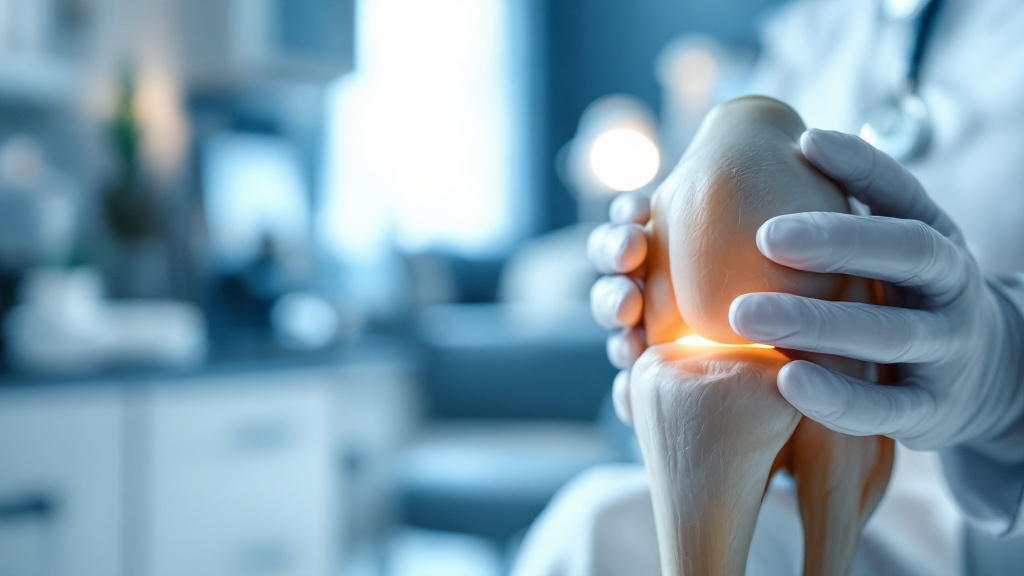Hearing a loud pop in your knee followed by pain and swelling can be alarming. Whether it happens during sports, exercise, or a simple movement, this could indicate a serious knee injury. Understanding the potential causes, symptoms, and treatment options can help you take the right steps toward recovery.
What Causes a Loud Pop in the Knee?

A popping sound in the knee often occurs due to an injury to the ligaments, cartilage, or bones. Here are some of the most common causes:
1. ACL Tear (Anterior Cruciate Ligament Tear)
The ACL is a crucial ligament that stabilizes the knee. A sudden twist, landing awkwardly, or a direct impact can cause a tear.
Symptoms:
- A loud popping sound at the time of injury
- Immediate swelling and pain
- Knee instability and difficulty walking
2. Meniscus Tear
The meniscus is a cartilage cushion in the knee. A sudden twist or deep squat can cause it to tear, leading to pain and swelling.
Symptoms:
- A popping sensation during injury
- Pain when twisting or bending the knee
- Knee locking or stiffness
3. Patellar Dislocation
The kneecap (patella) can shift out of place due to trauma or a sudden change in direction, causing a loud pop.
Symptoms:
- Visible deformity in the knee
- Swelling and pain around the kneecap
- Difficulty straightening the leg
4. MCL or LCL Injury (Medial or Lateral Collateral Ligament Sprain/Tear)
The MCL and LCL stabilize the sides of the knee. Sudden force from the side of the knee can cause injury.
Symptoms:
- Popping sound at the time of impact
- Pain on the inner or outer side of the knee
- Swelling and tenderness
5. Osteoarthritis
If you experience frequent popping sounds along with knee pain and stiffness, arthritis may be the cause. The breakdown of cartilage can lead to joint instability.
Symptoms:
- Chronic knee pain and stiffness
- Swelling after activity
- Grinding or popping sounds
What to Do Immediately After a Knee Injury?
If you experience a loud pop followed by pain and swelling, follow these first aid steps:
- Rest – Avoid putting weight on the injured knee.
- Ice – Apply an ice pack for 15-20 minutes every few hours to reduce swelling.
- Compression – Use a compression bandage to minimize swelling.
- Elevation – Keep your knee elevated to reduce fluid buildup.
- Pain Relief – Over-the-counter pain relievers like ibuprofen can help manage discomfort.
When to See a Doctor?
Seek medical attention if you experience:
- Severe pain that doesn’t improve with rest
- Significant swelling or bruising
- Knee instability or inability to bear weight
- A visible deformity or misalignment
A doctor may recommend X-rays, MRI scans, or physical tests to diagnose the exact injury.
Treatment Options for Knee Injuries
Treatment depends on the severity of the injury:
1. Physical Therapy
Strengthening exercises can help restore stability and prevent future knee problems.
2. Bracing and Support
A knee brace may be recommended to provide stability and prevent further damage.
3. Medication
Pain relievers and anti-inflammatory medications can help reduce swelling and discomfort.
4. Surgery
Severe injuries like ACL tears or meniscus tears may require arthroscopic surgery or ligament reconstruction.
Also Read: How To Prevent Knee Pain When Running – Expert Tips for Pain-Free Runs!
How to Prevent Knee Injuries
To reduce the risk of knee injuries:
- Warm up before exercise to prepare your muscles and joints.
- Strengthen leg muscles with squats, lunges, and leg presses.
- Use proper technique when running, jumping, or lifting.
- Wear supportive footwear to reduce stress on your knees.
- Avoid sudden, excessive movements that can strain knee ligaments.
FAQ’s
1. What does a loud pop in the knee followed by pain and swelling mean?
A loud pop in the knee, followed by pain and swelling, often indicates a ligament or cartilage injury, such as an ACL tear, meniscus tear, or patellar dislocation.
2. Should I be concerned if my knee popped but doesn’t hurt?
If there’s no pain or swelling, it may be harmless, possibly due to gas bubbles in the joint. However, if discomfort develops later, consult a doctor.
3. What should I do immediately after a knee injury with a pop sound?
Follow the R.I.C.E method: Rest the knee, apply Ice, use Compression, and Elevate the leg to reduce swelling and pain.
4. How can I tell if my knee injury is serious?
If you experience severe pain, swelling, knee instability, difficulty walking, or a visible deformity, seek medical attention immediately.
5. Can I walk on a knee that popped and swelled?
If there is pain, instability, or swelling, avoid putting weight on it and consult a doctor. Walking on an injured knee may worsen the damage.
6. How are knee injuries diagnosed?
Doctors may use physical examinations, X-rays, and MRI scans to diagnose ligament tears, cartilage damage, or bone injuries.
7. What are the treatment options for knee injuries?
Treatment ranges from physical therapy and bracing to medication and surgery, depending on the severity of the injury.
8. How can I prevent knee injuries in the future?
Warm up before exercise, strengthen leg muscles, use proper form, wear supportive footwear, and avoid sudden, excessive movements to reduce injury risk.
Final Thoughts
A loud pop in the knee followed by pain and swelling should never be ignored. It could indicate a serious injury requiring medical attention. Rest, ice, compression, and elevation can provide initial relief, but if symptoms persist, seek professional evaluation. Proper treatment and rehabilitation can help you recover fully and prevent long-term knee issues. If you’re experiencing knee pain after a pop, consult a doctor to get an accurate diagnosis and personalized treatment plan.
Related Post
- Zimatejigemo – Unlocking the Fusion of Creativity, Identity, and Innovation!
- Tinaypimatelate – The Revolutionary Concept Shaping the Future of Innovation!
- Limhuloxidpov – A Complete Guide to Understanding This Unique Concept!
- Zaxtexporoz – Exploring the Emerging Concept of Innovation and Digital Transformation!
- Lekulent – The Breakthrough Wellness Solution Taking the Health World by Storm!






